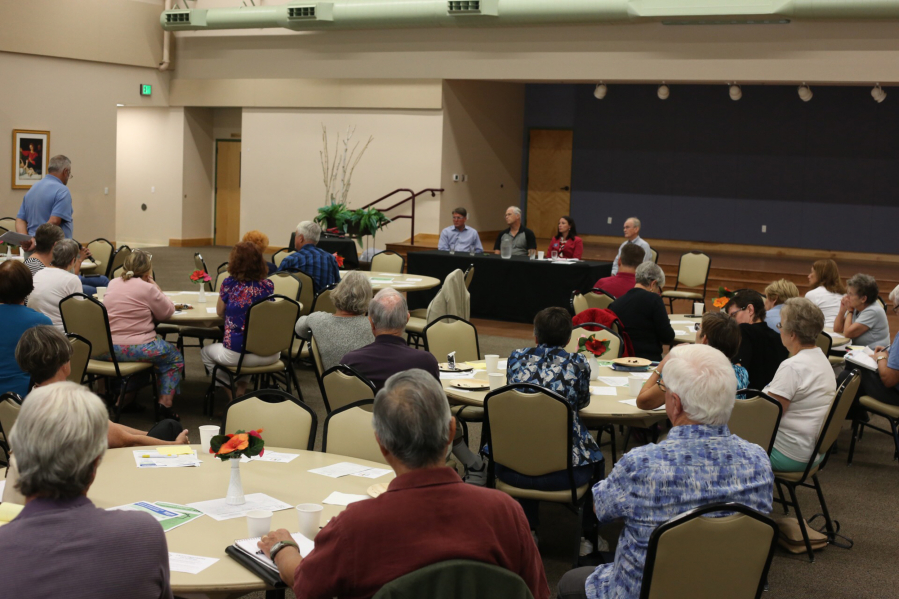In the winter months, when more homeless people flow nightly into shelters and warming stations, Denny Scott was struck by a realization.
After 50 sleeping pads were laid down in the gym of St. Andrew Lutheran Church, and a procession of Breathalyzer tests got underway, Scott said he noticed the types of homeless people had changed. He thought, so too might have the conditions that put them on the streets.
“What we’ve seen in the last few years is an increased number of families, an increased number of children, an increased number of folks who are sleeping on our floor (who) have a wake-up call at 4 a.m. to catch a bus to go to work,” Scott said. “That’s different than what it was 12 or 13 years ago.”
Rising rents and a tight housing market continue to pinch many low-income residents in Clark County, which is why St. Joseph Catholic Church welcomed local officials and religious speakers for a Saturday morning forum about how faith communities can help.
Joining Scott in speaking at the event, called the Faith & Housing Forum, were Vancouver City Councilor Alishia Topper, Clark County council Chair Marc Boldt, and Sierk Braam of Housing Initiative LLC.
The two-hour discussion touched on many facets of the housing crisis. Mainly, speakers strived to enlist the support of the faith community. About 50 people attended the event.
“We’re trying to raise awareness, we’re trying to get more people to know what the issues are here,” said Tom Iberle, executive director of Friends of the Carpenter. “It’s not a simple solution. It’s going to take a lot of time and a lot of different people coming together.”
Faith groups have historically been active in emergency programs, helping a person sleep or shower or pay a last-minute utility bill. Speakers at the event noted, however, those programs didn’t seem to slow the rise of tent cities, for example.
In 2015, several religious groups formed a coalition called Faith Partners for Housing, an effort to brainstorm lasting solutions.
Perhaps the biggest notion presented Saturday was that faith organizations could put their weight behind policy decisions at local, state and federal levels that would help put more affordable housing on the market.
“They can engage and mobilize a large body of voters for things that are important,” said Braam, a commercial real estate agent who now runs Housing Initiative LLC, a wholly owned subsidiary of the Council for the Homeless. “They can give our politicians the backbone to make some tough decisions.”
A recent example of such a policy: Vancouver City Council updated city rules near the start of August to make it easier for property owners to build and rent out accessory dwelling units.
Topper, who told the gathering her family struggled with housing while she grew up, said the thought was that any added supply in the city, even if they are small residences, can alleviate pressure in the real estate market.
“Although I think the majority of (the) council would agree that that’s not 100 percent going to fix affordable housing, but it increases inventory. Anything you can do to help,” she said.
Braam also implored property owners to be patient. Housing Initiative LLC develops affordable housing and it is often fighting for land that could more easily be sold and turned into strip malls.
“We’re targeting stuff that either needs to be rezoned and that can take a year. So your seller has to be with you for a year,” he said. “If (an owner) believes in the mission of affordable housing, one thing they can contribute is simply being patient. We’ll pay a market rate for that land, it’s just being willing to hang in there with us while we get everything in place.”
Those landowners might even be churches themselves. Faith organizations and nonprofits have more flexibility with land they own, Topper said, and could make an immediate impact if they wanted.
Iberle said he knew of “four or five churches that have land that they’re thinking about what they’re trying to do with.”
“To me that’s a huge possibility for building something,” he said. But, he added that neighbors to those properties might not welcome affordable housing construction.




